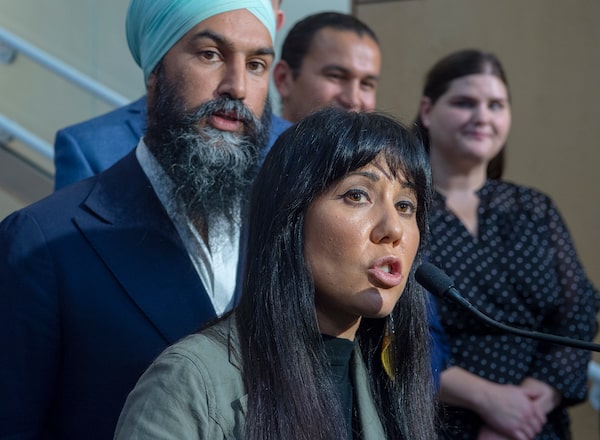
NDP Leader Jagmeet Singh looks on as then-Winnipeg Centre candidate Leah Gazan addresses supporters during a campaign stop at the University of Manitoba in Winnipeg on Sept. 24, 2019.Andrew Vaughan/The Canadian Press
Nearly two years after the federal Liberals announced a $724.1-million fund to support Indigenous women and girls facing gender-based violence, the money sits largely untouched, according to government figures as of May 31.
More than half of the fund is allocated to the construction of at least 38 new shelters and 50 transitional homes across Canada, but none of that money has been allocated. The fund’s remaining $304.1-million is intended to support the running of the new shelters, as well as violence prevention activities. The lack of construction means no operational funding has been spent, but the government has spent $12.6-million on prevention activities – representing less than 2 per cent of the total fund.
Winnipeg Centre MP Leah Gazan, who is the NDP critic for women and gender equality and requested the figures from the Liberal government, called the delay “appalling.”
“Not a single new shelter has been funded in Winnipeg – or across the country,” Ms. Gazan said. “There’s money sitting in the docket, while women, girls and 2SLGBTQQIA individuals continue to die.”
According to the office of the Minister of Housing and Diversity and Inclusion, the first review of funding requests is under way. The Canada Mortgage and Housing Corporation, which is responsible for the $420-million construction fund, will provide an update this summer on the number of projects selected and money is expected to be allocated for those projects this year. A spokesperson for Indigenous Services Canada noted that funding levels will increase annually over the fund’s five-year period and will roll over in the event of construction delays.
The fund, which was announced in fall 2020 as a “comprehensive Violence Prevention Strategy” and began distribution on the fiscal year starting April 1, 2021, was a response to issues raised by the National Inquiry into Missing and Murdered Indigenous Women and Girls, which completed its final report in 2019. Advocates have criticized the federal government for its lack of action on the inquiry’s 231 Calls for Justice. One such call is for all levels of government to support Indigenous-led “low-barrier shelters, safe spaces, transition homes, second-stage housing and services” for Indigenous women, girls and gender-diverse people experiencing homelessness, poverty and violence.
At a press conference Tuesday, Ms. Gazan called for the Liberals to immediately fund a 24/7, low-barrier safe space for women, girls and gender-diverse people in Winnipeg. She said the community has been calling for this space for more than 10 years, but it is particularly urgent after the deaths of several Indigenous women in the city last month.
“This space that we are fighting for – begging for – would offer shelter for those fleeing violence in a culturally appropriate setting,” she said.
Speaking alongside Ms. Gazan, Dodie Jordaan, the executive director of the Ka Ni Kanichihk organization in Winnipeg, said that the call for a 24/7 safe space came directly from women who were survivors of violence.
“We know that women are looking for and need a safe space, especially Indigenous women, who are far more likely to experience gender-based violence than our non-Indigenous relatives,” she said. “We know one of the women who was murdered in Winnipeg in May was looking for a 24/7 safe space.”
On Tuesday, two organizations, the National Indigenous Feminist Housing Working Group and Keepers of the Circle, which is an Indigenous hub operated by Temiskaming Native Women’s Support Group, submitted a human-rights claim to the Federal Housing Advocate titled Homeless on Homelands, focusing on the national housing crisis and its effect on Indigenous women and girls.
The groups are requesting a review by the inaugural advocate, Marie-Josée Houle, who was appointed in February with a mandate to examine systemic housing issues and make recommendations to government. Among other recommendations, they are calling for an Indigenous-led inquiry into the effects of housing funding programs on Indigenous women, girls and gender-diverse people.
At a press conference, Margaret Pfoh, chief executive officer of the Aboriginal Housing Management Association in British Columbia, said that the “financialization of the real estate market” and the COVID-19 pandemic have exacerbated the housing crisis for the most vulnerable.
“Housing rights are human rights. Indigenous rights are human rights,” she said. “And it is unfortunate that we had to come here today to file this claim.”
For subscribers only: Get exclusive political news and analysis by signing up for the Politics Briefing.